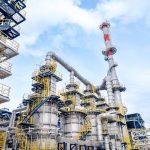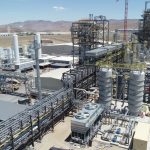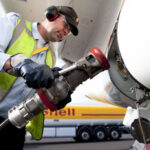United Airlines and Honeywell have announced a joint multimillion-dollar investment in Alder Fuels, a new cleantech venture headed by Bryan Sherbacow, founder of AltAir Fuels (now World Energy), the world’s first commercial sustainable aviation fuel (SAF) producer. United has also agreed to purchase 1.5 billion gallons of SAF over 20 years, the largest publicly announced SAF agreement to date, reports Susan van Dyk. The airline says the purchase is one-and-a-half times the size of the rest of the world’s airlines’ publicly announced SAF commitments combined. Alder claims it will be pioneering first-of-its-kind technologies to produce SAF at scale by converting abundant biomass, such as forest and crop waste, into sustainable low-carbon, drop-in replacement crude oil that can be used to produce aviation fuel. When coupled with Honeywell’s Ecofining process, the start-up says the technologies could have the ability to produce a carbon-negative fuel across the full lifecycle at a specification with today’s jet fuel.
United has pledged to reduce 100% of its greenhouse gas emissions by 2050 through large investments in SAF production, carbon capture and sequestration, and electric aircraft. It was the first airline to use SAF in regular operations on a continuous basis. Since then, the carrier has purchased more SAF than any other airline and now with this agreement has more than 70% of the airline industry’s publicly announced SAF commitments.
“Since announcing our 100% green commitment in 2020, United has stayed focused on decarbonising without relying on the use of traditional carbon offsets,” said United CEO Scott Kirby. “Part of that commitment means increasing SAF usage and availability since it’s the fastest way to reduce emissions across our fleet. However, to scale SAF as quickly as necessary, we need to look beyond existing solutions and invest in research and development for new pathways like the one Alder is developing.”
United made headlines in 2015 by investing $30 million in Fulcrum Bioenergy, a developer of SAF production from municipal solid waste, and signing, at the time, the largest offtake agreement for SAF. In 2020, United became the first airline to announce a commitment to invest in carbon capture and sequestration and has since followed with investments in electric vertical takeoff and landing aircraft and 19-seat electric aircraft that have the potential to fly customers up to 250 miles before the decade’s end.
To advance its goals, in June 2021, United formed United Airlines Ventures, a venture fund that focuses on startups, upcoming technologies and sustainability concepts that will complement United’s goal of net zero emissions by 2050. The joint investment with Honeywell in Alder Fuels is the latest from United Airlines Ventures and continues what the the company describes as a commitment to achieve carbon neutrality by 2050 by tackling emissions at their source and continuing and accelerating development and investment in clean technologies.
Back in 2008, Honeywell’s UOP process technology played a pioneering role in the first-ever commercial airliner to fly using biofuel from second generation, renewable feedstocks. Made from the oil of jatropha plants, a 50/50 blend was used to power an engine of an Air New Zealand Boeing 747-400 during a test flight.
Honeywell will use its Ecofining process to partner with Alder to commercialise its technology, which was jointly developed with Eni. UOP currently has licensed 20 Ecofining units in nine countries around the world, processing 12 different types of renewable feedstocks.
“Our work with United and Alder on this new technology will help transform the industry and support the growth of a zero-carbon economy,” said Darius Adamczyk, Honeywell’s CEO.
Currently, all commercial SAF volumes are produced from fats, oils and greases, a costly feedstock with limited availability to produce SAF at required scale. Shifting to other types of low-cost, low-carbon feedstocks that are available in significant quantities is considered critical to large-scale SAF volumes.
Little information, other than that it is a pyrolysis-type technology, is currently available on the specific technology that Alder Fuels will use. This type of technology produces a liquid intermediate that can be further upgraded into finished fuels such as SAF. It is in the upgrading process that Honeywell’s Ecofining technology and their advanced expertise in hydrotreating will become crucial to produce drop-in fuels such as SAF. Alder Fuels also envisages the suitability of the ‘green’ crude oil to be converted by the global refinery industry with existing equipment and infrastructure. Commercialisation is expected by 2025.
The new company’s President and CEO, Bryan Sherbacow, is a veteran in the industry with over 15 years’ experience in the development of low carbon fuels. He was responsible for the first commercialisation of SAF production as co-founder of AltAir Fuels in 2009, the world’s first refinery designed to produce SAF. Commissioned in January 2016, AltAir Paramount converted a petroleum refinery to the production of SAF, renewable diesel, naphtha and propane. Sherbacow negotiated the aviation industry’s first commercial contracts for SAF with United Airlines, KLM and World Fuel Services. Additionally, he executed the first contract for operational use of renewable diesel fuel by the US Navy. Subsequent contracts include with Gulfstream, Boeing, UPS and Amazon. In March 2018, he facilitated the acquisition by World Energy of AltAir and the Paramount refinery assets. Formerly Chief Commercial Officer of World Energy, Sherbacow will continue as senior advisor to the CEO of World Energy, according to his LinkedIn profile.
“Aviation poses one of the greatest technology challenges for addressing climate change and SAF has demonstrated the greatest potential. However, there is insufficient raw material to meet demand,” he said. “Alder’s technology revolutionises SAF production by enabling use of widely available, low-cost and low-carbon feedstock. The industry is now a major step closer to using 100% SAF with our drop-in fuel that accelerates the global transition to a zero-carbon economy.”
According to the US Department of Energy (DOE), US forestry residues and agricultural residues alone could provide enough biomass energy to generate more than 17 billion gallons of jet fuel and displace 75% of US aviation fuel consumption. If the nation was to broadly adopt regenerative agricultural practices, which capture more carbon in healthier soil compared to traditional methods, the US could generate an additional seven billion gallons of SAF, which would completely replace its current fossil jet fuel consumption. Alder’s technology and demand for its fuel from the aviation industry could create a large new market for biomass from regenerative practices.
Photo: United Airlines














More News & Features
SAF One announces new investment and technology partners for Middle East SAF project
New initiative formed to accelerate SAF adoption and production in the Pacific Northwest
EcoCeres opens new Malaysia production facility as SAF ambition in Asia scales up
Aviation, shipping and fuel leaders convene in Rotterdam to accelerate sustainable fuels scale-up
EU SAF mandates will have to be revised, predicts French oil chief
Lessons learned from the collapse of Fulcrum BioEnergy